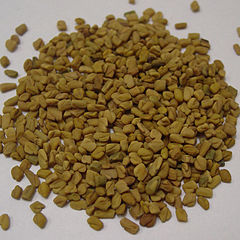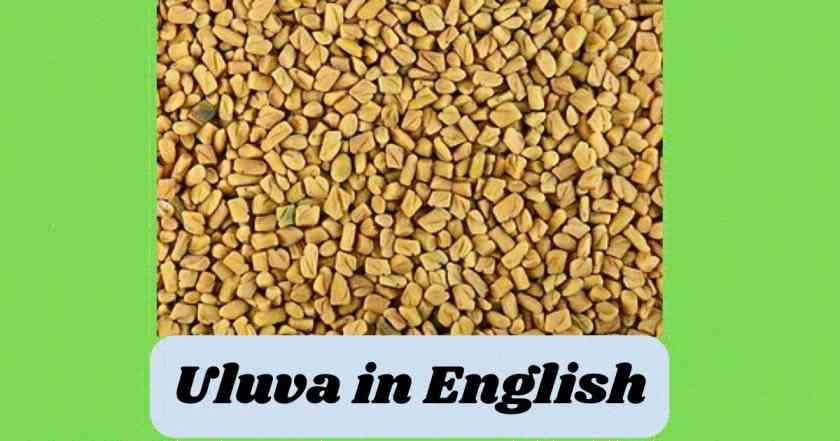Uluva in English
- Uluva meaning in English is “Fenugreek Seeds“
Uluva in Hindi
- Uluva in Hindi is “Methi Dana“
Uluva in Tamil
- Uluva in Tamil is “Vendhayam“
Uluva in Telugu
- Uluva meaning in Telugu is “Menthulu“
Uluva in Kannada
- Uluva meaning in Kannada is “Menthe / Menthya“
Uluva in Bengali
- Uluva meaning in Bengali is “Methi“
Uluva in Marathi
- Uluva meaning in Marathi is “Methi Dane / Methi“
Uluva in Gujarati
- Uluva meaning in Gujarati is “Methi“
Uluva in Oriya
- Uluva meaning in Oriya is “Methi“

What is Uluva / Fenugreek Seeds?
Uluva, also known as Fenugreek Seeds in English, holds a special place in culinary practices and traditional medicine. The term “Uluva,” originating from Malayalam, encapsulates a rich history of flavor and health benefits.
In the culinary world, Uluva adds a unique aroma and taste to dishes, especially in Indian cuisine. Its slightly bitter, nutty flavor enhances curries, pickles, and bread, making it a versatile spice loved by many. Beyond its culinary uses, Uluva boasts a myriad of health benefits, ranging from aiding digestion to promoting lactation in nursing mothers.
Scientifically known as Trigonella foenum-graecum, Uluva is a member of the pea family and thrives in warm climates with well-drained soil. Its small, golden seeds are packed with essential nutrients like iron, magnesium, and fiber, making it a valuable addition to a balanced diet.
Culturally, Uluva has been revered for centuries for its medicinal properties and culinary significance. Its seeds are often ground into a powder or used whole in cooking, offering a distinct flavor profile that elevates dishes to new heights. Whether used as a spice or for its health benefits, Uluva continues to be a staple in households worldwide.
Uluva, known as “Methi Dana” in Hindi, is called “Vendhayam” in Tamil. In Telugu, it’s referred to as “Menthulu,” while in Kannada, it is known as “Menthe” or “Menthya.” Bengali speakers use the term “Methi” for Uluva, while in Marathi and Gujarati, it’s termed as “Methi Dane” or simply “Methi.” In Oriya, it is also known as “Methi.”
English Name of Uluva
Delving into the English name of Uluva, we uncover its identity as “Fenugreek Seeds.” This translation sheds light on the plant’s essence and purpose, connecting it to its culinary and medicinal roles. The name “Fenugreek” hints at the plant’s historical significance, with “fenugreek” believed to have derived from the Latin word “faenum Graecum,” meaning “Greek hay.”
The choice of the English name reflects the plant’s characteristics and traditional uses. Fenugreek seeds have a hay-like aroma and are commonly used as a seasoning in various cuisines worldwide. Their distinct flavor profile, slightly bitter with a hint of sweetness, adds depth to dishes and enhances the overall taste.
Health Benefits of Uluva
Uluva, also known as Fenugreek Seeds, offers a plethora of health benefits that cater to individuals of all ages and backgrounds. Let’s delve into the nutritional composition and the positive impacts of incorporating Uluva into your diet.
- Rich in Nutrients: Uluva is packed with essential vitamins and minerals, including iron, magnesium, and manganese, which are vital for overall health and well-being.
- Digestive Health: Consuming Uluva can aid in digestion, thanks to its high fiber content. It helps regulate bowel movements and promotes a healthy gut.
- Metabolism Booster: Uluva is known to boost metabolism, which can be beneficial for individuals looking to maintain a healthy weight or support weight loss efforts.
- Blood Sugar Regulation: Studies suggest that Uluva may help regulate blood sugar levels, making it a valuable addition to the diet of individuals managing diabetes or insulin resistance.
- Anti-Inflammatory Properties: Uluva contains compounds that exhibit anti-inflammatory effects, potentially reducing inflammation in the body and supporting overall health.
- Heart Health: The consumption of Uluva seeds has been linked to improved heart health, including lower cholesterol levels and reduced risk of heart disease.
- Immune System Support: The nutrients in Uluva contribute to a strengthened immune system, helping the body fight off infections and illnesses more effectively.
- Skin Health Benefits: Uluva is believed to have skin-nourishing properties, promoting a healthy complexion and potentially aiding in the management of skin conditions.
- Hormonal Balance: Some studies suggest that Uluva may help balance hormones, particularly in women, offering relief from symptoms associated with hormonal imbalances.
- Energy Boost: Incorporating Uluva into your diet may provide a natural energy boost, helping you stay active and alert throughout the day.
By understanding the nutritional composition and health benefits of Uluva, individuals can make informed choices to enhance their overall well-being. Whether you sprinkle Uluva seeds on your dishes or brew them into a tea, the potential advantages for your health are vast and varied.
Medicinal Properties of Uluva
Delving into the medicinal properties of Uluva, unveils a rich history of traditional uses in herbal medicine. From ancient times to the present day, Uluva has been revered for its therapeutic benefits. Modern research has further validated its medicinal potential, shedding light on the scientific findings that support its healing properties.
One of the key medicinal benefits of Uluva lies in its ability to regulate blood sugar levels, making it a valuable natural remedy for individuals managing diabetes or insulin resistance. The seeds contain compounds that help improve insulin sensitivity, leading to better glucose control. This aspect of Uluva’s medicinal profile aligns with the growing interest in holistic approaches to health and wellness.
Moreover, Uluva is recognized for its anti-inflammatory properties, which can play a crucial role in reducing inflammation in the body. Chronic inflammation is linked to various health conditions, including heart disease, arthritis, and certain types of cancer. By incorporating Uluva into their diet, individuals can potentially mitigate inflammation and support overall health.
Additionally, Uluva is known for its digestive benefits. The high fiber content of the seeds promotes healthy digestion and can alleviate common gastrointestinal issues. Whether consumed as a spice in culinary dishes or brewed into a tea for medicinal purposes, Uluva offers a natural way to support digestive health.
As traditional wisdom meets modern scientific validation, the medicinal properties of Uluva continue to captivate individuals seeking natural remedies for various health concerns. By exploring the diverse therapeutic effects of Uluva, individuals can harness its potential to enhance their well-being in a holistic and sustainable manner.
Culinary Uses and Recipes of Uluva
Exploring the culinary versatility of Uluva opens up a world of flavorful possibilities for food enthusiasts of all ages. Whether you’re a seasoned chef or a novice in the kitchen, incorporating Uluva into your dishes can add a unique twist to your culinary creations. From savory curries to aromatic stews, Uluva’s distinct taste profile enhances a wide range of cuisines, making it a versatile ingredient that can elevate your cooking to new heights.
In traditional Indian cuisine, Uluva seeds are a staple spice used in various dishes, such as curries, dals, and pickles. The seeds impart a warm, slightly bitter flavor that complements the rich spices commonly found in Indian cooking. For those with a sweet tooth, Uluva can also be incorporated into desserts like halwa or sweet rice dishes, adding a subtle depth of flavor.
When it comes to cooking with Uluva, a key tip is to lightly roast the seeds before grinding them into a powder. This process enhances the aroma and flavor of the spice, intensifying its impact on the final dish. Whether you’re experimenting with new recipes or adding a twist to old favorites, Uluva’s culinary potential is boundless, offering a delightful culinary journey for all to savor.
Growing and Harvesting Uluva
Cultivating Uluva is a rewarding journey that offers not just culinary delights but also a deeper connection to nature. Understanding the cultivation methods and growing conditions is essential for a successful harvest. Uluva thrives in well-drained soil with plenty of sunlight, making it a versatile herb that can be grown in various climates. Whether you have a spacious garden or a small balcony, Uluva can be cultivated with ease, adding a touch of green to your surroundings.
When it comes to harvesting, timing is key. The seeds are typically ready for harvest when they turn a golden brown color, indicating their maturity. Harvesting and processing techniques play a crucial role in preserving the flavor and aroma of Uluva. By carefully drying and storing the seeds, you can ensure that they retain their freshness for an extended period, allowing you to enjoy the benefits of Uluva year-round.
Moreover, sustainability considerations are paramount in Uluva cultivation. By opting for organic farming practices and supporting local growers, you can contribute to reducing the environmental impact of herb cultivation. Embracing sustainable methods not only benefits the planet but also ensures a future where Uluva continues to thrive for generations to come.







